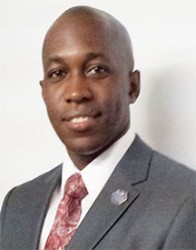Guyana Review talks with youth leader Astell Collins
GR: When you look at the various challenges facing Guyana how do you see your own ideas on leadership making a difference?
AC: It really is a matter of bringing another perspective to bear on tackling the issues. None of us have a monopoly of ideas and different approaches may be better suited to different situations. I have some ideas on youth leadership, for example, which I believe may be applied to addressing some of the particular –and one might add -difficult challenges confronting our young people and, by extension, our country. How critical are these challenges? In my opinion the available evidence suggests that we ignore them at our peril.
GR: What would you say is the emotional condition that makes a good leader?
AC: Leadership is about recognizing the responsibilities of the position that you hold above the privileges that might go with that position. Unfortunately, there are too many cases of the situation being the other way around where the quest for leadership positions is all about the acquisition of power for some narrow end. Those so-called leaders end up being tyrants and despots. They do not exercise power in the interest of giving service as is their obligation as leaders.
GR: Are you suggesting that we need to revisit our conventional understanding of what qualities define leadership?

AC: Absolutely! We are far too easily swayed by form rather than substance; by contrivances like appearance; by personality. We completely overlook the fact that people with ambitions often market themselves to appear to be what they are not. So that we don’t look deeper. We disregard the principles upon which they stand. As a result, ulterior motives are concealed beneath contrivances that masquerade as leadership and again it is prevalent in the political realm.
GR: From a developmental standpoint where is Guyana positioned at this time?
AC: That depends. I can tell you where we are not positioned. We are still to decide on a socio political formula for optimizing the opportunities that we have for making full and effective use of our potential. That is our biggest failing by a long way. In less than two years we will be half a century old as an independent nation and we are still to learn how to live with ourselves. That is a disturbing reality. We are neither at optimal productivity nor at maximum functionality; the process is more about power and who rules than about us moving ahead as a people. It occurs to me that at this rate we could go on like this for many more years. It simply does not seem to be occurring to us that our future as a nation is infinitely more important than the counterproductive divisions that we have. This is where inspirational leadership comes in. National transformation is therefore requiring radical change.
GR: Some social scientists talk about leadership at the social level while others talk about leadership at the political level. What is your own particular interest?
AC: I am concerned about leadership as it relates to human development… I am not certain as to where you categorise that. In a sense I am not keen on making that kind of distinction. I believe that the principles are really not that much different. The end objective of leadership is about a particular result that has to do with improving the human condition.
GR: How do we ensure that we have properly qualified political leaders to govern our country?
AC: Two points should be made here. First, for better or worse we have already settled on an electoral arrangement and that has been the mechanism for coming up with our political leaders. The second point is that we choose our political leaders from amongst the citizenry as a whole so that we need to equip them on a social level first. Politics without conscience and without social awareness is a recipe for disaster. It removes politicians’ sense of mission.
GR: Given the evidence of a discipline crisis amongst our young people do you consider the skill of parenting to be a deficiency in Guyana and how do we address that difficulty?
AC: The issue of parenting and its role in shaping the kind of society we live in is a real and formidable issue. It is, jn a sense, a reflection of our failure as parents. But it is more than trhat, We are all responsible. Collectively we do not care enough. Here again there are leadership issues not only at the level of the home but at the level of the wider society, at the level of those individuals and institutions that neglect to do their duty by creating an environment that offers our young people the best chance to succeed.
If the education system and the opportunities to succeed are limited and as long we do not have sufficient poverty alleviation measures in place then I think that we will always be in a boat without a paddle as far as the problem of young people is concerned. Of course there is also the issue of example. We often overlook the fact that there is a sense in which, as a nation, we do not lead by example. We overlook the collective responsibility that we have for raising the nation’s children and it is clear that that deficiency continues to come back to haunt us in various distressing and sometimes terrible ways.







